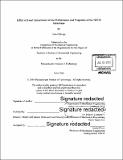Effect of feed temperature on the performance and properties of the NF270 membrane
Author(s)
Bolaji, John O. (John Olaoluwa)
DownloadFull printable version (3.162Mb)
Other Contributors
Massachusetts Institute of Technology. Department of Mechanical Engineering.
Advisor
John H. Lienhard, V.
Terms of use
Metadata
Show full item recordAbstract
An experimental study was done to explore the effect of feed water temperature on the properties and performance of nanofiltration membranes. The NF270 membrane was selected for this study, in which two temperatures of feed solution were passed through the membrane and water flux and salt rejection were measured. Results from fitting with experimental data show that water flux increased 23% and salt rejection changed minimally from 25°C to 40°C. A numerical fitting method used the experimental data to determine the parameters of the membrane: pore radius, effective active layer thickness, and volumetric charge density. From 25°C to 40°C, the fitted parameters showed a 29% increase in pore size, and an 84% increase in effective active layer thickness; volumetric charge density increased in magnitude by approximately 64%. Pre-compaction and pre-soaking the membrane in alcohol are two separate membrane pretreatment procedures that showed significant effects on the performance of the membrane.
Description
Thesis: S.B., Massachusetts Institute of Technology, Department of Mechanical Engineering, 2016. Cataloged from PDF version of thesis. Includes bibliographical references (pages 35).
Date issued
2016Department
Massachusetts Institute of Technology. Department of Mechanical EngineeringPublisher
Massachusetts Institute of Technology
Keywords
Mechanical Engineering.